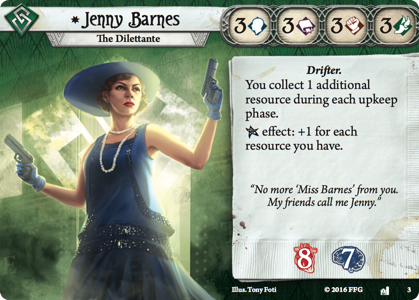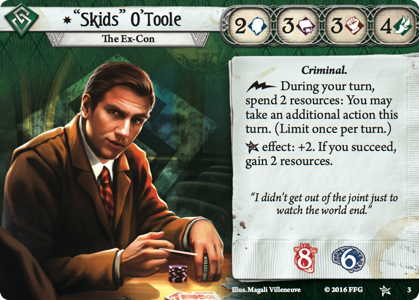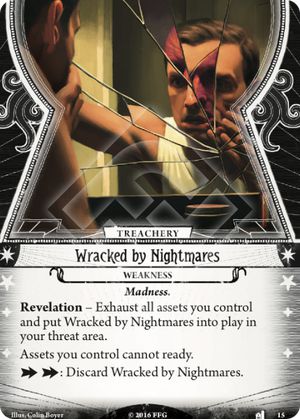A very varied group of characters is faced against the
madness of all sorts of horrors lurking beyond. Divers set of archetypes,
offering multiple playing styles and ways to deal with the supernatural threats
of all kinds. So far (core set and the spoilers we got from the first deluxe
expansion) FFG is doing a good job individualizing them. It’s possible because designers
started with multiple tools allowing for customizing investigators. Each
investigator has not only different skill values or class. They also have a
unique special ability and an individual effect resolving when an Elder Sign is
drawn from the Chaos Bag during a skill check (Elder Sign effect). It does not
stop here, though – every character has their own special cards being mandatory
part of their deck, both for good and evil (signature cards). The deck-building
requirements/options, unique for each character also contribute heavily to make
every investigator feel special.
Let me share my views on all of the above aspects:
1.
Skill values
Arkham uses a different approach to skills than its 2
predecessors. First of all, the amount of skills is the lowest (4). It is
definitely a good design choice due to the skill icon/skill check mechanic. If
there were too many possible checks, the icons would be useful too rarely.
What is bit less obvious, though, is that each skill has a
designated “specialized” test, even if not explicitly mentioned in the rules in
case of Will (used for casting spells; Combat is used for the fight tests, Lore
for investigating and Agility for evading). Both Arkham Horror and Eldritch
Horror had a skill not directly linked to any purpose (Luck and Observation,
respectively).
In a way skill system supports some sort of specialization –
since it is not possible to be good at every aspect of the game, it’s better to
succeed at most of Fight tests, than at 20% of Fight and Evade, for instance.
On the other hand, encounter cards or any other scenario related content can
ask for a skill check of any kind. For this reason low value of a skill might
cause trouble (“Grasping Hands” for low Agility character might be tough to
deal with, even more if you draw it more than once etc.). On top of that, you
are very often forced to investigate (as discovering clues drives the scenario’s
progress) and sometimes to fight (not only evading forever is not always an
option, but also scenario asks you to kill an enemy on occasions). Skill value
of 1 might therefore really mess up with progress of your investigation. And since
character will most probably excel in class-related skill(s), there might not
be too many options to mitigate the weakness with cards available to them
(unless neutral ones).
 |
| Despite what I've said about specialization, Jenny has an all-round set of skills |
2.
Special ability/abilities
This particular point can either shape the whole playing
style of a character, or easily just be a supportive thing, allowing for
multiple ways of leading the character. Without going into much detail,
consider these examples – while Agnes’ ability encourages you to find synergies
like “Forbidden Knowledge”, Skids’ extra action allows for more of a versatile
and adaptive approach, based on scenarios’ needs. Regardless of its nature,
unique special ability truly adds distinctive feel to the character and makes each
of them exceptional.
Elder Sign effect (I guess it’s the best way to call the
other half of investigator’s ability) is a very nice touch from a design point
of view. Even though you rarely draw the symbol, it’s a great feeling to
actually see it in your hand and be able to apply the effect. I am therefore
bit disappointed with the implementation. Why? Well, to answer this question we
must make a very basic observation – most of tokens in the chaos bag have a negative
modifier. Therefore, when attempting a skill check, one tries for the skill
value to be higher than difficulty. As a result, all the Elder Sign effects
boosting the skill value are not too useful, as skill value most probably was
higher than the skill difficulty anyway. The exceptions are very rare and
include some desperate long shots aimed specifically at drawing an Elder Sign,
or a test forced by scenario/encounter deck. More creative ideas for the Elder
Sign effect, like giving resources or allowing to draw cards are not only much
more playable, but very often much more thematic as well.
 |
| With an extra action every now and than, Skids can adjust to whatever is going on at the moment |
3.
Signature cards.
FFG team did an excellent job coming up with idea of
signature cards. You do feel so much like the character you’re playing, when
you can use the very special effect granted by an individualized card. It creates
an even greater playing experience (at least for me) to be faced with
personalized character flaw. It not only widens the spectrum of possible
results and choices, but also brings the game one step closer to a role-playing experience.
Signature cards can also interact in many interesting ways with each other
and/or character’s abilities.
So far each investigator got 2 signature cards – one “good
card” and one “bad card” (well, a weakness, technically speaking). The “good
one” being an asset/event (though I could easily imagine a skill as well) . This
approach will most probably be kept for most of the characters, but I wouldn’t
be surprised if an investigator got more cards for some thematic/game-play
reason.
Final note will include strength of the positive cards and
drawback of negative ones; hence a character with a very good positive card
might still only score a “3” if they also have a devastating weakness.
 |
| Weaknesses, relating to the stories origination from times of Arkham Horror truly add another layer of story-telling to the game |
4. Deck-building options/Class
Each investigator has a limited pool of cards to choose from,
when creating their own deck. The core set characters have access to 2 cards
belonging to 2 classes (unlimited options in their primary class and limited selection
of high level cards in their secondary class), as well as the neutral ones. The
Dunwich investigators can use all the cards of their class and any 5 of other
classes albeit only on 0 level. We can expect different deck-building options
for other characters; I personally wouldn’t appreciate too sophisticated ones
(like the one chosen for Marie), as it seems to mess too much with the class
idea.
Class itself might only be a thematic description, indicator
of investigator’s type, based on the fact that Marie cannot use all the Mystic
cards (she might be one of a kind exception, but then again, she might not). I
would, however, prefer it to be both
a solid high-level archetype, shaping both basic idea of an investigator
(his skill values, ability etc.) and their deck-building options – in my opinion character of a certain
class should always be able to take any card of that class.
I strongly believe that card choice affects the investigator’s
style the most, as AH:TCG is… well a card game. A player can choose almost 90%
of cards in their deck, even with signature cards system in place. 2 different
investigators with same deck would feel much more similar, than 2 completely
different decks for the same investigator. Currently there are not too many options
for a varied deck-building. Card pool will slowly, but steady grow in time,
though. I hope we’ll get to see more high level cards, especially, allowing for
a great character development (nice touch, mechanism similar to Mage Knight – deck-building seems to be able to nicely provide mechanic means for depicting
character’s progress). And since the deck is limited in size, with many 0 level
cards being a must have (to be replaced with their higher level copies, perhaps)
cards with “Permanent” keyword will come in very handy. Not to mention, they
provide a very strong RPG feel.
Limiting the card pool available to each investigator is a
brilliant design choice. First of all, it makes each investigator different; it
links playing cards with the investigator, with the archetype, with the class.
This way it nicely presents how different means are open to an FBI Agent and a
University Librarian, skilled in occult and magic. Second of all, it makes deck-building itself less important and puts the focus on actual playing. It
might be matter of taste; I am not a big fun of deck-building and value the
genuine game-play far higher. You spend less time creating perfect set of cards
and more being your character.
 |
| Have you noticed the restriction "No Fortune card"? Nice touch! |
I’m going to publish a post about every investigator, giving
my opinion on each aspect of their design. As mentioned in the opening post,
both game-play and theme aspect will be mentioned. I will try to throw in as
much advice and ideas in the mix as I can– feel free to be inspired, even by
the untested ones.
As a fan of Arkham Files I’m also planning to start each
description with some sort of legacy, mentioning how the concept of the investigator
developed through Arkham Files’ history. I enjoy using same characters over and over again and begun to like some of them through entire history of Arkham Files (I'm looking at you, Silas!)
 |
| Zoey's God-given mission has started back in Arkham Horror days and is still ongoing. |
All images are courtesy of cardgamedb.com and fantasyflightgames.com
No comments:
Post a Comment